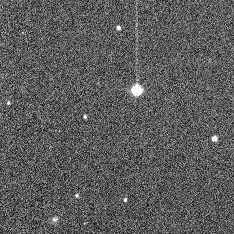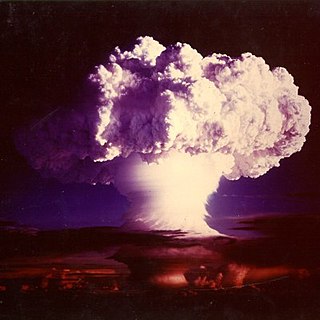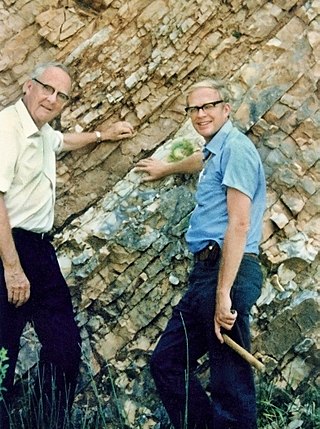
Nuclear winter is a severe and prolonged global climatic cooling effect that is hypothesized to occur after widespread firestorms following a large-scale nuclear war. The hypothesis is based on the fact that such fires can inject soot into the stratosphere, where it can block some direct sunlight from reaching the surface of the Earth. It is speculated that the resulting cooling would lead to widespread crop failure and famine. When developing computer models of nuclear-winter scenarios, researchers use the conventional bombing of Hamburg, and the Hiroshima firestorm in World War II as example cases where soot might have been injected into the stratosphere, alongside modern observations of natural, large-area wildfire-firestorms.

A fallacy is the use of invalid or otherwise faulty reasoning in the construction of an argument that may appear to be well-reasoned if unnoticed. The term was introduced in the Western intellectual tradition by the Aristotelian De Sophisticis Elenchis.

Asteroid impact avoidance encompasses the methods by which near-Earth objects (NEO) on a potential collision course with Earth could be diverted away, preventing destructive impact events. An impact by a sufficiently large asteroid or other NEOs would cause, depending on its impact location, massive tsunamis or multiple firestorms, and an impact winter caused by the sunlight-blocking effect of large quantities of pulverized rock dust and other debris placed into the stratosphere. A collision 66 million years ago between the Earth and an object approximately 10 kilometers wide is thought to have produced the Chicxulub crater and triggered the Cretaceous–Paleogene extinction event that is understood by the scientific community to have caused the extinction of all non-avian dinosaurs.
Gray goo is a hypothetical global catastrophic scenario involving molecular nanotechnology in which out-of-control self-replicating machines consume all biomass on Earth while building many more of themselves, a scenario that has been called ecophagy(the literal consumption of the ecosystem). The original idea assumed machines were designed to have this capability, while popularizations have assumed that machines might somehow gain this capability by accident.
Ecophagy is a term coined by Robert Freitas that means the consumption of an ecosystem. It derives from Greek οἶκος (oikos) 'house, household', and φαγεῖν (phagein) 'to eat'.

An impact winter is a hypothesized period of prolonged cold weather due to the impact of a large asteroid or comet on the Earth's surface. If an asteroid were to strike land or a shallow body of water, it would eject an enormous amount of dust, ash, and other material into the atmosphere, blocking the radiation from the Sun. This would cause the global temperature to decrease drastically. If an asteroid or comet with the diameter of about 5 km (3.1 mi) or more were to hit in a large deep body of water or explode before hitting the surface, there would still be an enormous amount of debris ejected into the atmosphere. It has been proposed that an impact winter could lead to mass extinction, wiping out many of the world's existing species. The Cretaceous–Paleogene extinction event probably involved an impact winter, and led to mass extinction of most tetrapods weighing more than 25 kilograms.
Inductive reasoning is any of various methods of reasoning in which broad generalizations or principles are derived from a body of observations. This article is concerned with the inductive reasoning other than deductive reasoning, where the conclusion of a deductive argument is certain given the premises are correct; in contrast, the truth of the conclusion of an inductive argument is at best probable, based upon the evidence given.
Policy debate is an American form of debate competition in which teams of two usually advocate for and against a resolution that typically calls for policy change by the United States federal government. It is also referred to as cross-examination debate because of the 3-minute questioning period following each constructive speech. Evidence presentation is a crucial part of policy debate. The main argument being debated during a round is to change or not change the status quo. When a team explains why their solvency is greater than the opposition's, they compare advantages. One team’s job is to argue that the resolution— the statement that we should make some specific change to a national or international problem —is a good idea. Affirmative teams generally present a plan as a proposal for implementation of the resolution. On the other hand, the Negative teams present arguments against the implementation of the resolution. In a single round of debate competition, each person gives two speeches. The first speech each person gives is called a “constructive” speech, because it is the speech when the first person of the team speaks positively, presenting the team's main idea without rebuttals that have not occurred, presents the basic arguments they will make throughout the debate. The second speech is called a “rebuttal”, because this is the speech where each person tries to rebut the arguments made by the other team, while using their own arguments to try to persuade the judge to vote for their team. The Affirmative has to persuade the judge to vote for the resolution, while the Negative has to persuade the judge the Negative's position is a better idea.

Human extinction is the hypothetical end of the human species, either by population decline due to extraneous natural causes, such as an asteroid impact or large-scale volcanism, or via anthropogenic destruction (self-extinction), for example by sub-replacement fertility.
In policy debate, a disadvantage is an argument that a team brings up against a policy action that is being considered. A disadvantage is also used in the Lincoln-Douglas debate format.

The Alvarez hypothesis posits that the mass extinction of the non-avian dinosaurs and many other living things during the Cretaceous–Paleogene extinction event was caused by the impact of a large asteroid on the Earth. Prior to 2013, it was commonly cited as having happened about 65 million years ago, but Renne and colleagues (2013) gave an updated value of 66 million years. Evidence indicates that the asteroid fell in the Yucatán Peninsula, at Chicxulub, Mexico. The hypothesis is named after the father-and-son team of scientists Luis and Walter Alvarez, who first suggested it in 1980. Shortly afterwards, and independently, the same was suggested by Dutch paleontologist Jan Smit.

In the psychology of human behavior, denialism is a person's choice to deny reality as a way to avoid believing in a psychologically uncomfortable truth. Denialism is an essentially irrational action that withholds the validation of a historical experience or event when a person refuses to accept an empirically verifiable reality.
"Of Miracles" is the tenth section of David Hume's An Enquiry Concerning Human Understanding (1748). In this piece, Hume states that evidence of miracles is never sufficient for rational belief.

A nuclear holocaust, also known as a nuclear apocalypse, nuclear annihilation, nuclear armageddon, or atomic holocaust, is a theoretical scenario where the mass detonation of nuclear weapons causes widespread destruction and radioactive fallout. Such a scenario envisages large parts of the Earth becoming uninhabitable due to the effects of nuclear warfare, potentially causing the collapse of civilization, the extinction of humanity, and/or the termination of most biological life on Earth.

A global catastrophic risk or a doomsday scenario is a hypothetical event that could damage human well-being on a global scale, even endangering or destroying modern civilization. An event that could cause human extinction or permanently and drastically curtail humanity's existence or potential is known as an "existential risk."

Green growth is a concept in economic theory and policymaking used to describe paths of economic growth that are environmentally sustainable. It is based on the understanding that as long as economic growth remains a predominant goal, a decoupling of economic growth from resource use and adverse environmental impacts is required. As such, green growth is closely related to the concepts of green economy and low-carbon or sustainable development. A main driver for green growth is the transition towards sustainable energy systems. Advocates of green growth policies argue that well-implemented green policies can create opportunities for employment in sectors such as renewable energy, green agriculture, or sustainable forestry.
The climate across the Cretaceous–Paleogene boundary is very important to geologic time as it marks a catastrophic global extinction event. Numerous theories have been proposed as to why this extinction event happened including an asteroid known as the Chicxulub asteroid, volcanism, or sea level changes. While the mass extinction is well documented, there is much debate about the immediate and long-term climatic and environmental changes caused by the event. The terrestrial climates at this time are poorly known, which limits the understanding of environmentally driven changes in biodiversity that occurred before the Chicxulub crater impact. Oxygen isotopes across the K–T boundary suggest that oceanic temperatures fluctuated in the Late Cretaceous and through the boundary itself. Carbon isotope measurements of benthic foraminifera at the K–T boundary suggest rapid, repeated fluctuations in oceanic productivity in the 3 million years before the final extinction, and that productivity and ocean circulation ended abruptly for at least tens of thousands of years just after the boundary, indicating devastation of terrestrial and marine ecosystems. Some researchers suggest that climate change is the main connection between the impact and the extinction. The impact perturbed the climate system with long-term effects that were much worse than the immediate, direct consequences of the impact.
This is a glossary of policy debate terms.

Asteroid impact prediction is the prediction of the dates and times of asteroids impacting Earth, along with the locations and severities of the impacts.

Scenarios in which a global catastrophic risk creates harm have been widely discussed. Some sources of catastrophic risk are anthropogenic, such as global warming, environmental degradation, and nuclear war. Others are non-anthropogenic or natural, such as meteor impacts or supervolcanoes. The impact of these scenarios can vary widely, depending on the cause and the severity of the event, ranging from temporary economic disruption to human extinction. Many societal collapses have already happened throughout human history.











